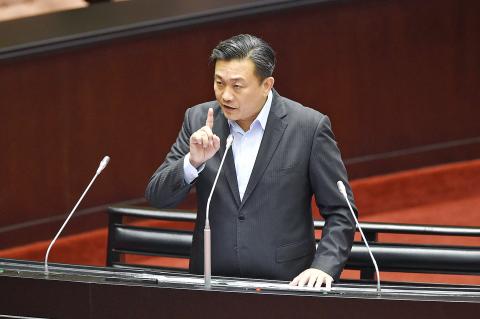Lawmakers, Aboriginal representatives and Presbyterian Church in Taiwan (PCT) pastors yesterday said that they are not members of the Chinese ethnic group (Zhonghua minzu, 中華民族) and do not want China to annex Taiwan.
“We are Aborigines of Taiwan, we are not of the Chinese ethnicity and we oppose China’s ‘one country, two systems’ policy,” Aboriginal representatives shouted at the beginning of a news conference in Taipei, joined by Democratic Progressive Party Legislator Wang Ting-yu (王定宇), New Power Party Legislator Kawlo Iyun Pacidal and Marie Lin (林媽利), Taiwan’s leading hematologist and an expert in medical anthropology.
“We strongly condemn the statements by Chinese President Xi Jinping (習近平) that people of Taiwan are members of the Chinese ethnicity, which denies the existence of Taiwan’s Aboriginal communities, and of our cultures and identities, which are different than those of Chinese people,” Atayal pastor Omi Wilang said.

Photo: George Tsorng, Taipei Times
“We want to stand together with President Tsai Ing-wen (蔡英文) and rally for national unity, so that all the peoples of Taiwan could advance toward a viable path to live in peace and with dignity,” PCT Indigenous Ministry Committee head Utux Lbak said.
Wang said that he rejects Xi’s doctrine that “Taiwanese must unite with China because of the Chinese bloodline, and that we belong to the Chinese ethnicity.”
“Taiwan is a land of multiple cultures and ethnic groups. It has many different bloodlines, each with its distinct cultural identity,” Wang said.
“Furthermore, Taiwan’s Aborigines are not members of China’s ethnic minorities,” he added.
Wang said that he also identifies as an Aborigine, as his mother is from the Siraya people, a plains Aboriginal group, and her family were members of the once-prominent Mattao Sia (麻豆社) community in present-day Tainan.
Kawlo Iyun Pacidal, an Amis, said that Aborigines lived in Taiwan first, but many immigrant groups elsewhere settled in the nation over the centuries.
“The majority of these groups have been in Taiwan for several centuries and no longer have any connection to China,” she said.
“Most of Taiwan’s ethnic groups have their own identity, thinking and beliefs,” she said. “So why would China not just consider becoming friends with the peoples of Taiwan instead of using its military might and threats of violence to bully Taiwan, as it has been doing in its policies and international relations?”
Lin cited research by her and other teams on bloodlines and migration in ancient times as showing that the ancestors of Taiwan’s Aboriginal groups came from various regions.
Among the settlers were Austronesians and southern Asiatic groups from Southeast Asia, Indonesia, southern China and Pacific islands, but also people from Northeast Asia, including Siberia, and present-day Korea and Japan, Lin said.
“It can be said that Taiwan’s Aboriginal groups are different from the Chinese ethnic group and cannot be considered to belong to the Chinese race,” she said.
“My studies have shown that Aboriginal groups here, including plains Aborigines, have very different bloodlines from Chinese people, as most of the groups came to these islands in ancient times, some of them before the end of the last ice age more than 10,000 years ago, when the rising oceans cut Taiwan off from China and the Asian continent.”

US climber Alex Honnold is to attempt to scale Taipei 101 without a rope and harness in a live Netflix special on Jan. 24, the streaming platform announced on Wednesday. Accounting for the time difference, the two-hour broadcast of Honnold’s climb, called Skyscraper Live, is to air on Jan. 23 in the US, Netflix said in a statement. Honnold, 40, was the first person ever to free solo climb the 900m El Capitan rock formation in Yosemite National Park — a feat that was recorded and later made into the 2018 documentary film Free Solo. Netflix previewed Skyscraper Live in October, after videos

NUMBERS IMBALANCE: More than 4 million Taiwanese have visited China this year, while only about half a million Chinese have visited here Beijing has yet to respond to Taiwan’s requests for negotiation over matters related to the recovery of cross-strait tourism, the Tourism Administration said yesterday. Taiwan’s tourism authority issued the statement after Chinese-language daily the China Times reported yesterday that the government’s policy of banning group tours to China does not stop Taiwanese from visiting the country. As of October, more than 4.2 million had traveled to China this year, exceeding last year. Beijing estimated the number of Taiwanese tourists in China could reach 4.5 million this year. By contrast, only 500,000 Chinese tourists are expected in Taiwan, the report said. The report

Temperatures are forecast to drop steadily as a continental cold air mass moves across Taiwan, with some areas also likely to see heavy rainfall, the Central Weather Administration (CWA) said. From today through early tomorrow, a cold air mass would keep temperatures low across central and northern Taiwan, and the eastern half of Taiwan proper, with isolated brief showers forecast along Keelung’s north coast, Taipei and New Taipei City’s mountainous areas and eastern Taiwan, it said. Lows of 11°C to 15°C are forecast in central and northern Taiwan, Yilan County, and the outlying Kinmen and Lienchiang (Matsu) counties, and 14°C to 17°C

STEERING FAILURE: The first boat of its class is experiencing teething issues as it readies for acceptance by the navy, according to a recent story about rudder failure The Hai Kun (海鯤), the nation’s first locally built submarine, allegedly suffered a total failure of stern hydraulic systems during the second round of sea acceptance trials on June 26, and sailors were forced to manually operate the X-rudder to turn the submarine and return to port, news Web site Mirror Daily reported yesterday. The report said that tugboats following the Hai Kun assisted the submarine in avoiding collisions with other ships due to the X-rudder malfunctioning. At the time of the report, the submarine had completed its trials and was scheduled to begin diving and surfacing tests in shallow areas. The X-rudder,